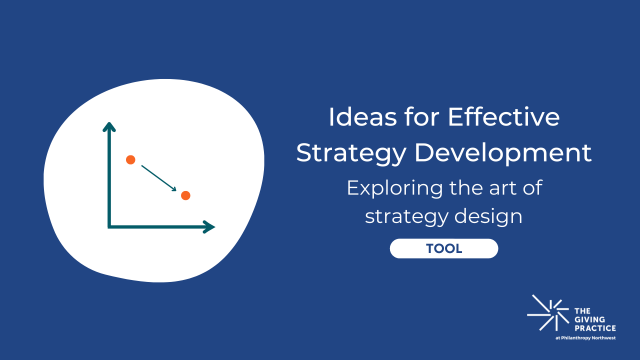Doug Stamm, president and CEO of Meyer Memorial Trust and a member of Philanthropy Northwest's board, has announced his plans to leave the foundation in 2018.
From the announcement:
Stamm, who was appointed in 2002, is only the second chief executive in Meyer’s 35 year history. Since its founding in 1982, the foundation has awarded more than 8,640 grants and program related investments totaling $717 million to more than 3,300 nonprofit organizations in Oregon and Southwest Washington. Last year, Meyer made 448 awards and paid out approximately $36 million. As of January, Meyer’s assets totaled $750 million.
Stamm has earned a national reputation in the philanthropic sector for his strategic exploration of innovative ways to invest a foundation’s endowment, beyond grantmaking, to further both mission and our financial goals. Most recently, he is perhaps best known for his and the trust’s work to address and dismantle deep disparities and inequities in Oregon.
During his leadership, Meyer redesigned its programs to ensure a more flourishing and equitable Oregon, became an early adapter and sector leader in mission related investing and undertook initiatives to tackle longstanding problems in education, affordable housing and the Willamette River.
“Doug’s vision brought Meyer’s mission to life, and his ability to assemble an extremely talented and diverse group of professionals will benefit the Trust — and Oregon — for years to come,” said Charles Wilhoite, chair of Meyer’s Board of Trustees. “In his passionate commitment to Meyer, Doug has built a firm, equity-focused foundation for the Trust’s work. We are grateful to have his valuable leadership while we manage this important transition.”
A national search will begin this summer to find Meyer’s next steward. Stamm plans to take a short break before pursuing opportunities to advance equity and inclusion in the independent sector.
“It’s been an amazing privilege to serve Oregonians and steward Fred Meyer's legacy,” said Stamm. “I am proud of how Meyer has explored and pursued ways to make a greater impact in our community and I am honored to have worked alongside Oregon’s nonprofit, community and elected leaders to shape programs that respond to the most pressing needs across our state.
Meyer’s approach to its program efforts came after a yearlong learning process that involved the input of thousands of Oregonians, including nonprofit, philanthropic and community leaders across the state.
Meyer now works to heighten its impact in Oregon by making investments that close gaps created by inequities in four key areas: housing, education, the environment, and Oregon’s diverse communities. Under this approach, Meyer hired staff with expertise in the four fields and reorganized its grantmaking to:
Eliminate inequities and improve conditions experienced by marginalized populations in public education;
Advance policy and systems solutions to ensure environmental justice, healthy ecosystems and clean water and air in all our communities;
Address housing affordability and inequities so every Oregonian has a safe place to call home; and
Strengthen the community’s leadership and voice to ensure that solutions are developed by the people who are impacted.
"Throughout the redesign of Meyer's programmatic strategy and grantmaking, Doug has truly engaged community, staff and trustees as partners in the co-creation of our vision and direction,” said Candy Solovjovs, Meyer’s Director of Programs. “With the strong leadership he has cultivated throughout our organization, Meyer could not be better poised to continue advancing equity in Oregon with commitment, clarity and stability."
“Doug has been a true champion for equitable opportunities for the rapidly growing and diverse communities of color in Oregon, supporting our collective vision to take significant steps forward in building leadership pipelines and addressing structural and institutional barriers,” said Lee Po Cha, executive director of Portland’s Organization Immigrant and Refugee Community Organization (IRCO). ”His efforts have strengthened our community's potential to build fair policies and practices that actually move the needle toward real equity for all Oregonians.”
Meyer’s work on equity, diversity and inclusion has transformed the racial makeup of its staff and board. Today, Meyer is a foundation with 37 employees and three Philanthropy Northwest Momentum Fellows. Half of the staff identify as people of color; more than two-thirds identify as women. Meyer’s board and executive teams are similarly diverse: two-thirds of trustees and nearly half of the executive team members identify as people of color, and women make up two-thirds of trustees and six of seven executive team members.
“This is a team rich in talent and experience, well-suited to carry forward our work and commitment to make Oregon a more equitable place,” Stamm said. “I’m excited about Meyer’s future.”
Along with Stamm, Luz Vega-Marquis, president and CEO of Marguerite Casey Foundation in Seattle, belongs to a regional cohort of foundation leaders working to bring greater equity into philanthropy.
“It’s a true pleasure and honor to work alongside a visionary like Doug,” Vega-Marquis said. “When he leaves in 2018, he’ll be greatly missed but his bold equity legacy will energize the Northwest philanthropic community for years.”
Stamm will continue to serve as CEO until a successor is in place, staying onboard through a good part of 2018 to help Meyer’s next leader settle in smoothly. Trustees plan to enlist an executive recruitment firm with a track record of identifying diverse pools of exceptional candidates and pledge to pick Meyer’s next leader from a diverse finalist pool — or start fresh.
“Doug’s contributions to Meyer Memorial Trust are immeasurable,” said Debbie Craig, Meyer’s longest serving trustee. “The impact that Doug has made on nonprofit groups in Oregon and Southwest Washington extends far beyond the 4,883 grants that have been made since he was appointed chief executive in 2002. His leadership in equity has encouraged all of us to thoughtfully and carefully examine our approach to philanthropy.”
For more information, visit www.mmt.org.


